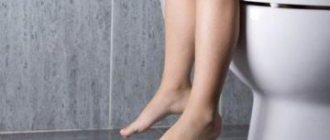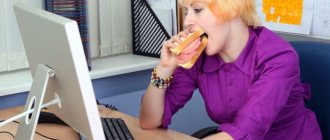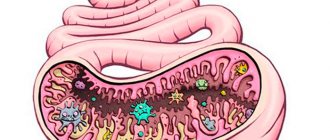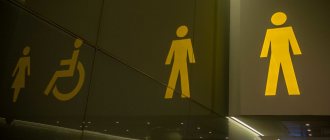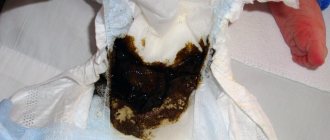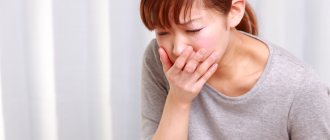What can cause diarrhea from undigested food?
- Main reasons
- Symptoms
- Treatment methods
Among the rather unpleasant and unexpected symptoms of a pathological health condition in humans is diarrhea.
It occurs for a number of reasons and is accompanied by various associated symptoms. In some cases, foreign particles can be found in the stool, which indicate a possible cause of the disease. Many patients complain of loose stools with pieces of undigested food.
This always causes panic, since normally feces should be of a uniform consistency.
Main reasons
Among the causes are factors of various etiologies. Some can be eliminated in a short time, while others require quite long-term treatment. Among the main aspects that cause diarrhea with undigested food are:
- Excessive consumption of food in the daily diet;
- The food is equipped with a lot of fatty foods;
- Food eaten at one time, which was heterogeneous in composition;
- Failure in the production of enzymes (qualitative or quantitative);
- A diet too rich in fiber (especially insoluble fiber);
- Accelerated peristalsis of the intestinal wall;
- Diseases, past or present, localized in the organs of the digestive tract (especially if the pathology is in the stomach or pancreas).
People who are at risk for developing loose stools are specifically identified. These include infants whose digestive system has not yet formed and the functioning of enzymes has not yet been adjusted. As well as older people who have intestinal upset and poor production of enzymes that break down food.
Symptoms
There are situations when diarrhea with undigested food is accompanied by additional symptoms. In this case, a mandatory visit to a specialist is required to determine the exact cause and prescribe competent treatment. Danger signs include the following:
Medical help is also necessary if diarrhea with undigested food occurs without additional symptoms, but for a long time. It is very important when visiting a doctor to fully describe all the signs of the development of a pathological condition.
It is recommended that during self-treatment or waiting for an ambulance, you record the amount of body weight lost, how many times the need for bowel movements arose, the presence of hyperthermia, and accompanying symptoms. It is important to remember what and in what quantity was consumed in the diet.
Based on the data obtained, laboratory tests, additional studies (if necessary), the doctor will be able to determine the cause that provoked the disease, as well as find out the etiology of the disease. Only after this is effective treatment prescribed.
Note!
If loose stools are observed for a long time, and treatment is carried out with incorrect and inappropriate medications, then the condition of diarrhea can develop into a chronic form. In this case, chronic diarrhea will be observed for several months. Therefore, it is very important to start proper therapy from the first hours, especially if it concerns a small child.
Treatment methods
Recovery therapy and necessary medications are determined based on the diagnosis. If the reason lies in insufficient production of enzymes by the pancreas, then the doctor prescribes medications such as Mezim or Pancreatin.
These products help digest food and prevent it from entering the feces in its original form. If gastritis with low acidity is diagnosed, Omeprazole and other medications containing hydrochloric acid are prescribed.
This treatment method effectively combats diarrhea and stops the progression of existing pathology. If colitis or gastroenteritis has been diagnosed, the condition will be accompanied by inflammation in the intestines. Depending on the etiology, anti-inflammatory or antibacterial medications are prescribed.
In case of intestinal upset due to ballast foods, it is recommended to simply review the diet and eliminate heavy foods.
After treatment, you must follow a diet for 10–12 months. The diet should exclude foods that lead to inflammation of the intestinal mucosa.
These include fatty foods, alcoholic drinks, carbonated drinks, foods high in fiber, both soluble and insoluble. A good effect is observed with regular intake of herbal teas with chamomile, eucalyptus, and mint.
If a relapse occurs, immediate medical attention is required.
Loading…
Source: https://ponosanet.com/diareya-neperevarennoj-pishhej.html
Watermelon as a product
In fact, it is a healthy berry that has a lot of positive features and components. It perfectly removes waste and toxins from the body due to its structure. The antioxidants contained in watermelon also contribute to the overall strengthening and toning of your body, and have antimicrobial properties. Let's look at the composition of this product per 150 g.
- Sugar 9-10 g (1 g – sucrose, 2.4 g – glucose, 5.2 g – fructose)
- Water 135 g.
- Fiber, 2% Daily Value. Helps in removing cholesterol from the body and normalizes digestion.
- Vitamins: A. 18% daily value. C. 20-25% of the daily value. B1, B6. 3-9% daily value.
- Potassium 5-7% daily value. One of the most important elements for the functioning of the heart.
- Magnesium 4-5% daily value. Takes part in stabilizing blood pressure, intestinal function, and bile secretion. Reduces the likelihood of gallstones and kidney stones.
- Other macro- and microelements (calcium, selenium, iron, manganese, copper, zinc, phosphorus) 1-3% of the daily value.
Watermelon is also an excellent diuretic due to the fact that it consists of 80% water. By washing away harmful substances, it fills the body with a large number of useful microelements. Maintaining this balance is paramount in diarrhea.
Nevertheless, despite a number of such beneficial properties, it is worth understanding why watermelon can still cause diarrhea.
Undigested food in the feces (lientorrhea) in an adult: causes and diagnosis of pathologies
Lientorrhea is the appearance of undigested food residues in the stool.
This symptom occurs in diseases of the digestive tract and indicates a malabsorption in the stomach and small intestine. Lientorrhea may also be a variant of the norm.
The one-time appearance of foreign impurities is not a reason for making a diagnosis. If the situation repeats, you need to see a doctor and get examined.
Non-pathological causes
Gastroenterologists warn: the appearance of undigested pieces of food in the stool is not always considered a pathology. Often, lientorrhea is associated with trivial reasons:
- Eating foods rich in indigestible fiber. This category includes vegetables and fruits, herbs, and grains. This phenomenon is often observed among vegetarians. If fiber is unable to be digested, it transits through the digestive tract and is eliminated naturally.
- Binge eating. Eating a large amount of food overloads the stomach and intestines and leads to the fact that the gastrointestinal tract cannot cope with the load. Some food is not digested and appears in the feces.
In these conditions, lientorrhea is short-term and is not accompanied by a significant disturbance in well-being. No special treatment is required. Diet correction helps to cope with the problems that have arisen and restore the functioning of the digestive tract.
Pathological causes
- Diseases of the digestive tract associated with insufficient production of gastric juice and pancreatic enzymes: gastritis with reduced secretion, pancreatitis. At the same time, the digestion of food that is easily broken down under normal conditions is disrupted.
- Diarrhea of various origins (including infectious). In this condition, food quickly passes through the intestines and does not have time to be fully processed.
- Intestinal dysbiosis. Violation of the biocenosis of the digestive tract interferes with the digestion of food and leads to lientorrhea.
- Taking certain medications. Certain groups of medications reduce enzymatic activity and interfere with normal digestion of food.
In gastrointestinal pathology, lientorrhea recurs repeatedly and is accompanied by unpleasant symptoms.
The severity of the disease depends on its severity and the individual sensitivity of the body.
Associated symptoms
Short-term lientorrhea, not associated with diseases of the digestive tract or other problems, usually remains asymptomatic. Slight heaviness in the abdomen and moderate flatulence may occur.
The following signs speak in favor of pathology:
- the appearance of a sharp and unpleasant odor of feces;
- severe bloating;
- pain around the navel and in the sides of the abdomen;
- rumbling in the stomach and flatulence;
- diarrhea;
- belching;
- heartburn;
- increase in body temperature (indicates an active inflammatory process).
If any of these symptoms appear, you should consult a doctor - a therapist or gastroenterologist.
Diagnostic scheme
To determine the cause of lientorrhea, an examination is prescribed:
- Coprogram. Normally, feces should be well-formed, without a strong odor or pathological impurities. The appearance of protein, connective tissue, pus, blood, fatty acids and starch indicates the development of pathology.
- General clinical blood and urine tests. Allows to identify the inflammatory process and concomitant pathology.
- Ultrasound of the abdominal organs. It is used for an initial assessment of the situation and making a preliminary diagnosis.
- Endoscopic studies. Colonoscopy and sigmoidoscopy are used for visual assessment of the intestinal mucosa, detection of tumors, polyps and other conditions.
Based on the results of the diagnostics, the optimal treatment tactics will be selected.
Principles of therapy
If lientorrhea associated with pathology of the digestive tract is detected, treatment is carried out by a gastroenterologist. Therapy is based on diet and medication.
Diet
General recommendations during exacerbation:
- frequent split meals - small portions 5-6 times a day;
- reducing the total calorie content of food to 2200 kcal/day;
- rational distribution of meals throughout the day (minimum in the evening);
- consumption of mechanically processed food (priority is given to pureed cereals, purees, boiled meat and fish);
- refusal of fried, spicy and salty foods;
- limiting the amount of salt to 5 g per day;
- reducing the proportion of extractives in food.
We recommend reading:
How to take a stool test for Giardia?
After the exacerbation subsides, the diet is expanded to include foods rich in protein. The total calorie content of food increases to 2600-2800 kcal/day.
Exact nutritional recommendations will depend on the identified pathology, its severity and the presence of concomitant diseases. The diet is developed by a gastroenterologist after diagnosis.
Medicines
Conservative treatment is based on the prescription of enzyme preparations that facilitate the digestion of food and normalize the functioning of the digestive tract. The selection of specific medications is carried out by a doctor, taking into account the severity of the pathological process. The dosage and duration of administration are determined individually.
Additionally, the following may be assigned:
In case of severe damage to the digestive tract, surgical treatment is indicated.
Prevention
Simple recommendations will help you avoid the appearance of lientorrhea:
- do not overeat;
- eat often, but in small portions, avoid long gaps between meals (no more than 4 hours);
- Chew your food thoroughly while eating;
- treat any diseases of the digestive tract in a timely manner;
- Take medications only as prescribed by your doctor.
The prognosis for functional lientorrhea is favorable. No special treatment is required and the condition improves within a short time. With pathological lientorrhea, the prognosis is determined by the nature of the underlying disease.
Source: https://ProKishechnik.info/zabolevaniya/neperevarennaya-pishha-v-kale-u-vzroslogo.html
Symptoms of watermelon poisoning
Diarrhea arising from watermelon has similar symptoms to any other poisoning because, often, it has one root - chemicals. They develop from 2 hours to 1 day after consuming the product:
- Nausea, vomiting;
- Loose stools (10-15 times a day);
- Abdominal pain;
- General weakness;
- Headache;
- Increased body temperature.
In rare, more severe cases, cardiac activity is disrupted due to a decrease in blood pressure (heartbeat increases, shortness of breath appears). This is due to the fact that nitrites (formed from nitrates) interfere with blood functions such as oxygen transfer. When exposed to them, blood vessels dilate, which contributes to the appearance of hypoxia (lack of oxygen). Blue discoloration of the lips and nail bed is also observed. With a high concentration of nitrates, gastrointestinal organs may be damaged, which will lead to bloody stools. If there are problems with the liver, the whites of the eyes will acquire a yellow tinge. In such cases, you should immediately seek medical help.
Undigested food in stool: causes of diarrhea with leftover pieces of food - Website about
An intestinal disorder such as diarrhea in itself leads to despair and requires urgent measures.
But when loose stools occur with food, especially over a long period of time, panic and fear for your health may occur. After all, feces should normally be of a uniform consistency.
Why is food not digested? What does diarrhea with pieces of recently eaten food mean?
Main causes of pathology
The reasons that provoke the appearance of loose stools with pieces of undigested food can be very diverse. Moreover, some of them can be eliminated in a short period of time, while others will require long-term treatment.
Among the main factors leading to pathology are the following:
- eating too much food;
- food has high fat content;
- food of heterogeneous composition, taken at one time;
- qualitative or quantitative disturbances in the production of enzymes;
- an abundance of fiber in the diet, especially indigestible fiber;
- functional dyspepsia (intestinal dysfunction due to stress);
- taking medications that inhibit the functioning of enzyme systems;
- dysbacteriosis;
- accelerated peristalsis of the intestinal wall;
- diseases of the digestive tract (existing or past), especially the stomach and pancreas.
We can also identify risk groups of people predisposed to the appearance of loose stools with food.
These include infants who have an insufficiently formed digestive system, as well as older people and old people who experience intestinal disorders and enzyme deficiency with age.
Another risk group is people who have problems with the functioning of the digestive tract due to internal diseases.
In what cases is specialist help required?
Individual fragments of food may remain undigested under normal conditions. These include: hay from fruits, berries, vegetables, insoluble plant fiber (cellulose, lignin), seeds and others. If, during diarrhea, pieces of regular food come out with stool, then the situation requires the intervention of a specialist.
You should definitely consult a doctor if loose stools with undigested food in adults and children are accompanied by symptoms such as:
- putrid or other odor;
- pain and cramping in the epigastric region;
- increased body temperature;
- blood, pus, mucus, foam in stool;
- rotten burp.
Useful information: Severe heaviness in the right side: all causes of the symptom
A doctor's help will also be required if diarrhea with food remains occurs without these symptoms, but for a long time.
It is important to provide the specialist with the most complete information about the disorder. For example, you will need to track changes in body weight, the presence or absence of appetite, the time of onset of diarrhea, its frequency, connection with food intake, and so on.
Therapeutic measures
If the digestion process is disrupted due to gastritis with low acidity, then, among other drugs, Omeprazole and drugs directly containing hydrochloric acid may be present. Such treatment will make it possible not only to eliminate diarrhea, but also to stop the progression of the disease.
In the case of colitis or gastroenteritis, diarrhea with undigested food is accompanied by inflammation of the intestinal mucosa. Depending on the degree and type of pathology, treatment with antibacterial agents and anti-inflammatory drugs is indicated.
If the disorder is caused by excessive consumption of ballast substances, it is enough to reconsider the diet. By excluding plant fiber from the menu, you can quickly restore the functioning of the digestive tract.
During the entire period of treatment, regardless of the cause of the intestinal disorder, strict adherence to the diet is required. It involves a complete rejection of foods that irritate the mucous membrane of the digestive tract. These are: spicy and fatty foods and foods, alcoholic drinks, foods containing fiber (soluble and insoluble), carbonated drinks.
Traditional medicine recipes
As an additional treatment for loose stools with pieces of food, the use of folk recipes is allowed. The main condition for their use is a preliminary examination and diagnosis. It is unacceptable to eliminate diarrhea on your own without knowing the cause of its occurrence, especially in repeated cases of the disorder.
Useful information: Treatment of chronic diarrhea: the best folk remedies
- Chamomile. For a glass of boiling water you will need 10 grams of dried flowers. It is best to insist in a thermos for 5-6 hours. Take a third of a glass 3-5 times a day.
- Eucalyptus. For two spoons of dry leaves, 0.5 liters of boiling water will be enough. Infuse in the same way in a thermos. Take 1/3 cup before meals.
- Mint. Prepare an infusion at the rate of: a glass of boiling water and 3 tablespoons of dry leaves. Drink 100 ml every 34 hours during the day.
Features of diarrhea with food in infants
It is normal for undigested food particles to be present in an infant's stool. This phenomenon is explained by the imperfection of the infant’s digestive system. In addition, the gastrointestinal tract of a small child is shorter than that of adults. Therefore, the food does not have time to be digested.
The occurrence of loose stools with undigested food in an infant can be caused by improper introduction of complementary foods. Feeding your baby pureed vegetables and fruits too early will cause a corresponding reaction in the form of diarrhea mixed with pieces. The enzymes necessary to digest the new food will not be enough, so the body will “throw it away” as unnecessary ballast.
Loose stools containing undigested food
: January 14, 2020 at 05:57 pm
At least once in his life, a person notices that he has diarrhea due to undigested food. There are several reasons for changes in the digestive process. Most often, diarrhea with undigested food appears during fermentation that occurs in the intestines.
A similar process can be caused by abundant consumption of foods that contain fiber. A healthy person can cope for a certain amount of time with the load placed on the intestines and stomach, but over time, the cells of the gastrointestinal tract become overstrained.
This disorder causes dyspeptic diarrhea.
If no symptoms occur other than loose stools with particles of undigested food, do not worry too much. You just need to remember what was consumed during lunch or dinner.
Symptoms of dyspeptic diarrhea
Another symptom is bloating. When intestinal colic occurs, a person experiences pain and discomfort. Despite signs of diarrhea and disruption of the digestive process, the patient’s general condition does not change. He feels cheerful.
Before starting treatment, you need to determine the reasons why diarrhea with undigested pieces of food could appear. There are several main reasons:
- Pancreatic insufficiency;
- Eating fiber that the stomach cannot digest and its remains come out with diarrhea;
- Accelerated evacuation of food from the gastrointestinal tract;
- Poisoning from expired products.
Treatment of loose stools with undigested food
- Products containing fiber;
- Alcoholic and carbonated drinks;
- Fatty meats;
- Spicy dishes.
After the diet has been adjusted, you should start taking medications such as Creon and Mezim-Forte.
If the cause of diarrhea with pieces of food is insufficiency of gastric juice caused by gastritis with low acidity, the doctor will prescribe therapy. In addition to therapy, hydrochloric acid and Omeprazole are prescribed. Thus, it is possible to eliminate loose stools and stop the development of gastritis.
As for the accelerated evacuation of food, which manifests itself in the form of loose stools and pieces of undigested food, this condition can be caused by inflammatory processes. Most often this occurs due to:
Treatment is carried out in accordance with the identified pathology. It is difficult to treat such diseases at home, so the patient is hospitalized in a hospital. The patient is prescribed:
- Broad spectrum antibiotics;
- Regidron;
- Anti-inflammatory drugs such as Analgin.
If you experience diarrhea caused by excessive consumption of foods containing fiber, you should simply exclude such foods from your diet. The diarrhea will stop the very next day and the digestion process will quickly recover.
Source:
Causes and treatment of lientorrhea in adults and children
Lientorrhea, as a pathology, can then become a cause for concern when two more symptoms are added to the identified problems, directly indicating malfunctions in the digestive system.
Causes of the phenomenon
The process of digestion of chewed food occurs due to the work of the gastrointestinal tract and under the influence of accelerated peristalsis in two ways: wave-like, or gradually, so the reasons that caused failures in the system may differ.
- In the first case, a failure occurs based on the nature and physiological characteristics of the body, manifested against the background of improper selection of food products or for other reasons, for example, swallowing unchewed pieces of food during meals.
- Pathological changes occur against the background of chronic diseases, where lientorrhea is one of the symptoms.
Physiological
The physiological causes of manifestations of lientorrhea include factors that do not cause absolutely any harm to the body and do not significantly affect the functioning of its organs.
- Functional dyspepsia. This type of manifestation is mostly the result of a negligent attitude towards a healthy lifestyle and a healthy diet. In addition to incomplete digestion of food, belching, pain in the upper part of the stomach and nausea are observed.
- As a side effect of medications. Some medicinal substances during the treatment of diseases can create conditions that inhibit the functioning of the digestive system by reducing secretion, which is responsible for the release of gastric juice and a number of enzymes.
- Dysbacteriosis. A downward change in the balance of microflora beneficial to the body can negatively affect the quality of food absorption.
Is it possible to eat watermelon if you already have diarrhea?
In the case where the patient has irritable bowel syndrome, or there is a bacterial infection, you will have to forget about eating watermelon for a while. Is it possible to eat watermelon when diarrhea is a frequent guest? It is possible, but only in small quantities and infrequently. Remember that food should only bring benefits, and if the gastrointestinal tract is already under increased stress and is working in emergency mode, let alone watermelon, you should not eat any fruits and berries at all.
Otherwise, diarrhea (especially in a child) may intensify, causing a lot of inconvenience and delaying the recovery process.
Stool analysis indicators
Consumed food, passing through the gastrointestinal tract, is subjected to chemical and mechanical processing. This is where water and nutrients are absorbed into the blood and lymphatic system, as well as the formation and removal of all undigested food debris from the body in the form of feces. Its density depends on how long it takes for the food bolus to pass through the entire gastrointestinal tract. During normal functioning of the digestive system, feces should not be too loose or too dense. If the consistency of the stool is very different from the norm, and its smell is too strong, this is a reason to take a stool test to determine the digestibility of food.
Why is fiber not broken down in the digestive tract?
Even in ancient times, varieties of table, fodder and sugar beets were bred. It was also used as a medicinal plant. Beet culture is labor-intensive: the seeds grow together into inflorescences, which produce several seedlings when sown. They need to be thinned out. Previously, this was done manually.
Feces are formed as a result of food passing through the stomach and intestines from undigested food debris. During the processing of food in the body, some of the substances are not absorbed and are excreted along with feces.
.
Rules for choosing a quality watermelon
Try to be careful when choosing a watermelon if you decide to use it during diarrhea or just in the summer:
- Do not take a watermelon that has already been cut into pieces (in half, with the center cut out for tasting). Bacteria can enter the pulp not only from the surface of the berry, but also from the knife (on which their concentration can be high).
- Dip the pulp into water. A good sign would be uncolored liquid. If it turns red or pink, it means the watermelon has an increased concentration of chemicals.
- Do not give watermelon to children under 1 year of age; after that, no more than 100 per day is allowed.
As a result, we see that such a berry is full of useful properties and elements. But due to the desire to make a big profit, you can’t buy a good product everywhere. Therefore, make purchases only in trusted places, because high-quality watermelon is completely harmless and will not cause diarrhea.
Treatment at home
If you have mild diarrhea, you can cope with it at home. The essence of treatment is to remove the poison and neutralize it in the intestines.
- The first thing to do is rinse the stomach. To do this, drink a large amount of warm salted water (or a pale pink solution of potassium permanganate). Trigger your gag reflex. This procedure must be repeated until the water coming out is clear (2-3 times).
- Next, you need to take special medications - enterosorbents. They help neutralize poisons in the body. For example: Activated carbon, Smecta, Enterosgel.
- Drink more fluids. This will help flush toxins out of your urine and also prevent dehydration.
- In case of diarrhea as a result of eating watermelon with harmful microorganisms, take an antimicrobial drug (Nifuroxazide).
- After the nausea ends, drink sweet tea. It will help soothe your throat and relieve tension.
- It is not recommended to take painkillers. They only mask the condition of the body and do not help cure the cause.
Treatment in a hospital setting includes neutralization of methemoglobin, oxygen therapy, the use of cardiac drugs and hepatoprotectors for the liver.


